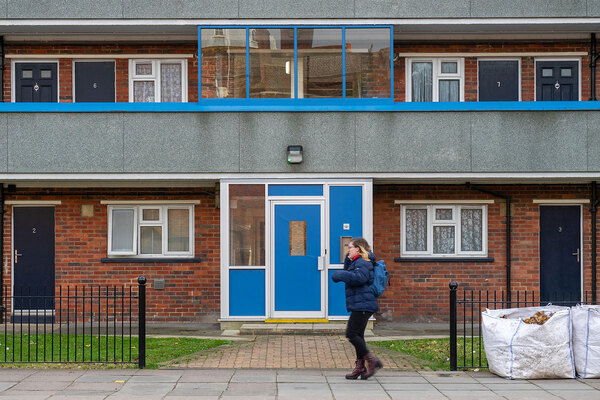You are viewing 1 of your 1 free articles
Construction skills hubs must be followed up with a plan for social housing professionalisation
As the government looks to step up housebuilding, the sector must be prepared to manage these homes, writes Sara Roberts, chief operating officer at Kingdom Academy
As the UK looks to its future under the Labour government, many industries are watching closely for signs of how growth will be driven, challenges addressed and campaign promises fulfilled. For the housing sector, the announcement last year of construction skills hubs has been met with cautious optimism.
This represents a significant step towards addressing the severe shortage of skilled labour in construction. But while attention is being directed towards building more homes, there’s an urgent question hanging over the sector: who will manage these homes and support tenants once they’re built?
The construction skills hubs initiative forms a key part of Labour’s pledge to deliver 1.5 million new homes over the next five years – a bold target that requires an expanded, skilled workforce.
Industry figures have repeatedly warned of the scale of the problem. The Big Issue reported that 300,000 construction workers exited the sector in the past five years, leaving a skills gap that very desperately needs to be filled.
The Autumn Budget outlined ambitious social housing goals, including a five-year rent settlement and enhanced funding for safe and quality housing. New qualification requirements for social housing professionals – projected to add £8m-£15m annually – underscore the financial and logistical pressures councils and housing associations face.
These organisations must now strive to meet higher standards while also investing in staff training. While new construction workers will build the housing, housing professionals are crucial to ensuring tenants’ lives are improved for years to come.
“Just as the construction skills hubs aim to meet labour shortages head on, the professionalisation agenda should be viewed as an essential investment”
Backed by a £140m investment, these 32 homebuilding skills hubs will create 5,000 new construction apprenticeships each year, focusing on areas with high housing demand. Roles in bricklaying, plastering, scaffolding, roofing, carpentry and electrical work will be at the heart of the training offer.
Yet, with all hubs scheduled to be operational by 2028, there remains a three to four-year window in which other parts of the housing sector must prepare to meet the demands of a more complex and regulated operating environment.
This is where the professionalisation of social housing comes into play. If the country is to avoid repeating the failures of the past, it’s not enough to build more homes – there must be a simultaneous drive to ensure that those responsible for managing them have the skills, knowledge and qualifications required to do the job properly. The introduction of the Social Housing (Regulation) Act 2023 made this clear. The act sets new standards for the sector, placing an onus on housing providers to professionalise their workforces.
Under the new regulations, social housing providers managing more than 50 homes are required to ensure their senior housing staff are qualified to Level 4 or 5 standards by 2026, or at least actively working towards these qualifications. While the government’s consultation on this is still ongoing, there’s no question that this requirement has sparked concern within the sector. It’s estimated that as many as 25,000 workers may need upskilling. If the construction industry has been given until 2028 to establish the skills hubs, the timeline for housing professionalisation is even tighter.
This shift comes at a cost. Early estimates suggest the financial impact on councils and housing associations could be as high as £8m to £15m annually. For a sector already grappling with the pressures of delivering safe, affordable housing, this represents a major challenge. However, just as the construction skills hubs aim to meet labour shortages head on, the professionalisation agenda should be viewed as an essential investment, not an additional burden. The long-term benefits far outweigh the short-term costs.
“By formalising qualifications and career paths, the sector can attract new talent and offer clear progression routes for existing staff”
Prioritising the professionalisation of the housing sector also helps change perspectives on the sector, helping to make it an attractive, exciting place to work. By formalising qualifications and career paths, the sector can attract new talent and offer clear progression routes for existing staff.
Investing in the professional development of housing staff, therefore, not only supports individual career progression but also ensures that organisations are better equipped to tackle future challenges, from policy changes to evolving resident expectations. By fostering a culture of excellence, housing associations can improve tenant satisfaction, reduce business risks, and establish themselves as leaders in a rapidly changing environment.
More than anything, prioritising professionalisation is about prioritising safety. Tenants, landlords and industry experts have called for change in the sector for years, and the past decade has seen a growing awareness of how negative the social housing experience has been for many people.
In 2025 and beyond, the professionalisation of social housing must be a government priority. It goes beyond compliance with the Social Housing (Regulation) Act. It’s about rebuilding trust, creating better living conditions for tenants, and restoring pride and purpose to a sector that has long been maligned. Labour’s pledge to build 1.5 million homes is ambitious and necessary, but a holistic approach is essential for achieving lasting change. Construction skills hubs are a start. But social housing professionalisation must be next.
Sara Roberts, chief operating officer, Kingdom Academy
Sign up for our daily newsletter
Already have an account? Click here to manage your newsletters













